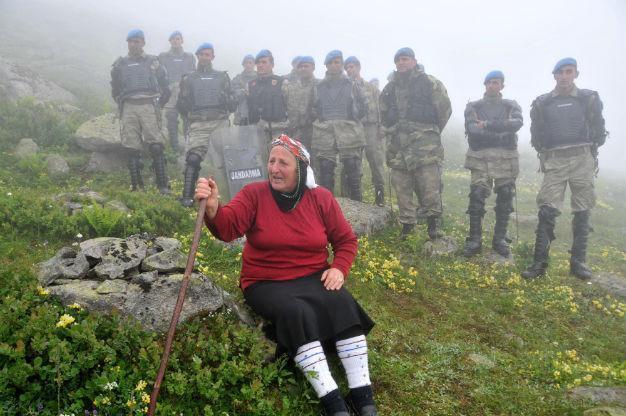Court halts execution of plan covering northern ‘Green Road’
RİZE

DHA photo
Turkey’s Council of State has annulled a comprehensive environment regulation plan, including a 2,600-kilometer-long road construction, stating that the plan would pave the way for the commercialization of naturally protected areas in the Black Sea region.
Basing its arguments on an expert report, the Council of State said in its ruling that the Environment Regulation Plan, which covers six Black Sea provinces as well as the long-disputed Green Road project, would do nothing to protect natural areas such as forests, basins, agricultural and upland areas in the region, Doğan News Agency reported.
The ruling came four years after the Turkish Foundation for Combatting Soil Erosion, for Reforestation and the Protection of Natural Habitats (TEMA), a nongovernmental organization fighting for environmental sustainability, filed a lawsuit with the Council of State in late 2011 against the regulation plan drafted by the Environment and Urban Planning Ministry in August 2011 for six Black Sea provinces: Rize, Artvin, Trabzon, Gümüşhane, Giresun and Ordu.
TEMA, however, told the Hürriyet Daily News that it had not received any official document validating the issuance of the Council of State ruling.
The expert report stated that the plan took into account the quality of urban life rather than a sustainable way of life. The Green Road project conspicuously included plans to construct restaurants, hotels and ski resorts.
The Environment Regulation Plan was first drafted by the Environment and Urban Planning Ministry in August 2011 before TEMA filed an appeal into 36 articles of the regulation plan, but yielded no results.
TEMA then filed a lawsuit with the Council of State demanding the cancelation and suspension of the execution of the regulation plan in December 2011.
In November 2013, a committee of experts formed by members of the Council of State, along with academics from the Middle East Technical University (ODTÜ), conducted an inspection at 36 different areas considered for the execution of the Environment Regulation Plan, which also includes the Green Road project.
The group of experts stated in the report that constructing access roads to connect upland villages would make the supervision of vehicular traffic and change conventional village lifestyle more difficult, noting that the regulation plan would pave the way for the commercialization of natural areas and thus boost construction activities.
“Connecting upland villages with roads parallel to the Black Sea, to which mountains are topographically perpendicular, would result in great environmental damage,” the report said, adding that the Green Road project should also be stopped.
The beginning of construction on the Green Road has been widely protested by locals and environmentalists since early July, when caterpillars were brought to the uplands to cut down trees in Rize. Sit-in protests were staged to prevent caterpillars from working, while gendarmerie forces attacked groups by forcibly dragging them away after they refused to move from in front of the demolition trucks.
Even though the Rize Administrative Court suspended the execution of the Green Road project on July 13 following a case filed by the Fırtına İnsiyatifi (Storm Initiative), an environmental activist group, trees were cut in the Ausor, Haczane and Husor highlands in Rize’s Çamlıhemşin district on July 14.
Daily Hürriyet reported on July 15 that the Green Road project was drafted to attract Arab tourists as stated in the Action Plan on the Eastern Black Sea Project (DOKAP). Announced by Prime Minister Ahmet Davutoğlu before the June 7 parliamentary elections, DOKAP underscored that the Green Road project was of great importance for the tourism potential of the region.
The draft also noted that the planning works of the tourism regions on the proposed route would be completed quickly and that they would be prepared to facilitate private sector investments.
The project has been widely criticized for its negative impact not only on the environmental character of the areas affected but also on the culture and lifestyle of local residents, destroying the unique nature of the upland villages.
